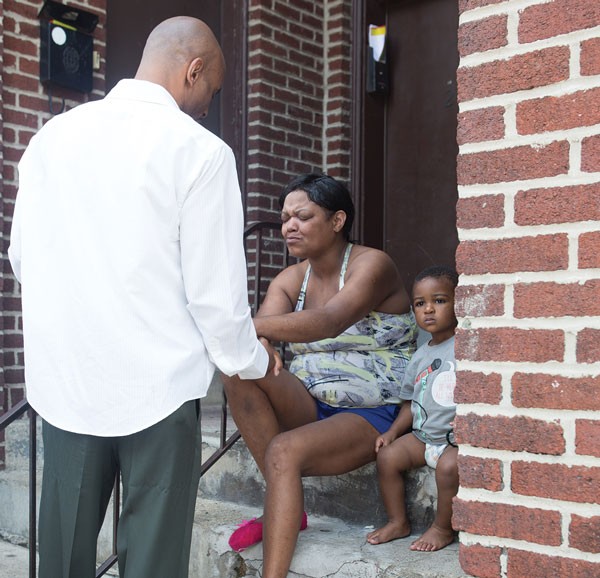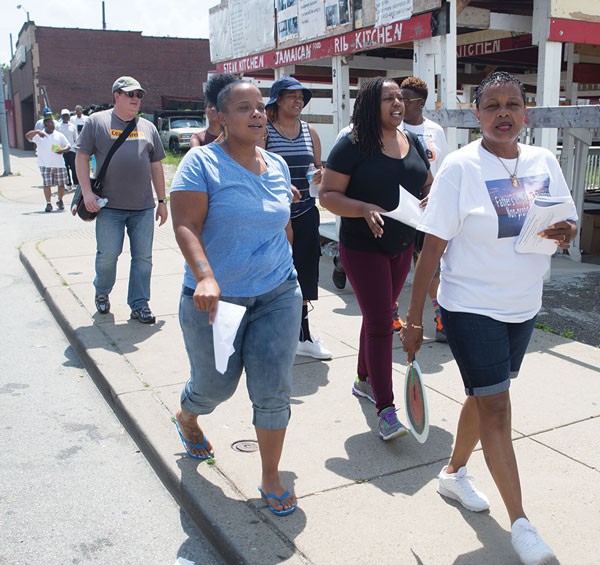On a hot June day, 34-year-old Autumn Perkins and about a dozen others set out from New Life AME Church in Homewood with water bottles and flyers in hand. They went into bars, barbershops and convenience stores. Their goal: to get people to come forward with information about homicides in the community.
"A lot of people know who's out here doing the killing," said Perkins. "But a lot of them are scared of retaliation, and they don't trust the police enough."
The "peace walk" in Homewood was organized by We Need Justice Too, an organization founded by Perkins and various local community groups. Made up mostly of individuals who've had a family member violently injured or killed, the group's approximately 50 active members have spent the past few months working to reduce violence in their communities.
Perkins herself lost the father of her three children, who was killed in July 2013: His killer has never been found. And as the death toll in Pittsburgh rises, she worries about her children, especially her oldest son, who is set to start high school this fall.

"It's so bad out here right now, it's scary," says Perkins. "I grew up when gang-banging was bad and it was not this bad then. I'm scared for my kids. All these mothers are out here grieving for their children."
"The group started very organically," says Shannon Williams, an organizer with gun-control group CeaseFirePA. Perkins "had enough and she wanted to do something about it."
But Perkins and her group are up against steep odds. The city has seen a sharp increase in homicides, with 11 people killed in July alone. So far, some 44 homicides have been committed in Pittsburgh this year. At that pace, Pittsburgh may match or beat a record for homicides set in 1993.
We Need Justice Too was created after the February murders of Susan and Sarah Wolfe, two white sisters who were killed in East Liberty. A suspect was arrested less than a month later, and group members started wondering why so many murders in the black community remain unsolved. Of the 214 unsolved homicides between 2004 and 2013, 85 percent involve black victims.
"I think the homicide detectives should be held accountable for all of the unsolved homicides," says group member Connie Moore, whose son was killed and whose murder remains unsolved. "I don't think they're doing all they can do."
Police, meanwhile, say they need more help from the community. "There have been numerous shootings when there have been people around and yet no one comes forward," counters Sonya Toler, spokesperson for the Pittsburgh Bureau of Police.
"We can't ask for help unless we're willing to help ourselves," agrees Charlie Ragan, another member and producer of Peace Pittsburgh, a program on violence that airs on public-access cable channel PCTV. That's why We Need Justice is focusing on community outreach, calling on residents to come forward with information on homicides.
Organizers have teamed up with a number of activist organizations including CeaseFirePA. Jay Gilmer, director of the Pittsburgh Initiative to Reduce Crime, is a fixture at We Need Justice meetings. He provides them with information on public-safety procedures and connects the group with law-enforcement officials.
"I like to support any individual or group who's attempting to reduce violence," Gilmer says.
"We won't get anywhere if we're working in silos," says Williams.
During their walk through Homewood in June, the 15 participants ranged from convicted felons to city officials, including Corey Buckner, special assistant to Mayor Bill Peduto. They handed out information on education and job opportunities, gun safety and how to submit anonymous information to the police. But they also hoped their presence would send a message to criminals that the community will not tolerate any more murders.
"A lot of communities don't do this," said Chaunte Bryant-Davis, from partner organization Fathers Who Care Foundation. "I think we should do one of these in every neighborhood."
Along the way, participants stopped to comfort a woman sitting on her front stoop. As her grandson peered out from the front door, she explained how all four of her children had died. One had been shot just around the corner.
"They need to know there's people who care," said We Need Justice member Tonya Raeberry, whose brother was shot and paralyzed.
But anti-violence groups face a series of challenges.
The We Need Justice Facebook group, for one, has garnered almost 5,000 members. But getting people to show up for meetings and activities has been more difficult. "If the community doesn't step up and speak out, nothing's going to happen," Perkins says.
Encouraging residents to step forward may have gotten harder after 15-year-old Leroy Powell was shot and killed in Duquesne last week. Powell had testified as a witness in a preliminary hearing on a homicide case the week before.
"When the little boy got killed, that put people right back at square one," Perkins says.
"People have to talk to the police to help solve the crimes that plague our community," says Ragan. "But if the police don't protect witnesses, they become victims. This is why people won't talk. The police and community must do a better job of working together."
Police spokesperson Toler cautions against drawing too many conclusions from Powell's death: Powell, she says, "was not in protective custody." She says witness protection is available to anyone who comes forward with information in a homicide.
We Need Justice's next action, a rally at the City-County Building Downtown, is scheduled for Aug. 29. There they will call on city leaders to make reducing violence a priority.
"We are tired of burying our children," says Ragan. "We are asking all public officials, clergy, community leaders and concerned citizens to come together and work on solutions."
Among their demands is the implementation of a ShotSpotter surveillance system, approved by city council in June 2013. The system uses cameras and microphones to quickly notify police when and where a shooting occurs, but to date it hasn't been installed.
Even though the system was approved last year, a contract with ShotSpotter Inc. wasn't signed until this past May.
"The cameras were supposed to have been up months ago," says Perkins. "We've been hearing ‘cameras, cameras, cameras.' There's been how many homicides in the last few weeks and we still have no cameras."
At a press conference last week, Public Safety Director Stephen Bucar identified drug trafficking as a driving force behind the spike in homicides. But Perkins believes police should focus on gun trafficking as well.
"We need a gun task force going just as hard," Perkins says. "These days, when kids have a feud, they don't fight — they just pull out a gun. It's too easy for them to get a gun."
Perkins says she has seen an increase in the number of street patrols in her neighborhood, and the city has pledged to increase patrols in Zone 5 which has seen the greatest number of homicides recently. Five of last month's 11 homicides were in Zone 5.
"Since Mayor Peduto has been in office, I've seen more police out here on bicycles. He seems to want to help the community," Perkins says. "I'm not just going to blame the police: There's blame that goes all around."
"We can't police ourselves out of this situation," Toler says. "We can't afford to put a cop on every block, and the community would not want to be in that situation: It would be a militarized zone."
Councilor Rev. Ricky Burgess, who proposed the ShotSpotter system for Homewood, agrees. While he couldn't say how soon the system would be fully implemented, he says it's only a short-term solution.
"The real problem is concentrated poverty," Burgess says. "Without resources in the community, violence is bound to happen."
But, he adds, "When you have these community groups where people are encouraging their neighbors to come forward, it's important."















